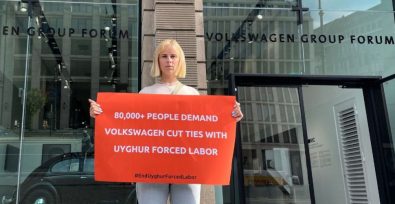Volkswagen has officially sold its plant in China’s Uyghur region, marking a significant step amidst ongoing allegations of Uyghur forced labor in the region. After years of global scrutiny, the decision represents a win for human rights advocates worldwide. While Volkswagen cited economic factors and market challenges as motivations, this move aligns with growing pressure on corporations to uphold ethical standards in their supply chains.
Forbes reports that Volkswagen’s plant in Urumqi, established in 2013 through a joint venture with SAIC Motor, had become a focal point for allegations linking it to systemic abuses against Uyghur Muslims. Rights groups have accused the Chinese government of forcing Uyghurs into labor programs as part of its crackdown in the region. Though the plant ceased producing cars in 2019, concerns over its operations lingered, prompting significant public backlash. The sale to SMVIC, a Chinese state-owned enterprise, closes this chapter for Volkswagen, but raises questions about corporate accountability moving forward.
“Human rights are non-negotiable”
Volkswagen’s decision to sell its Uyghur plant comes after years of sustained pressure from human rights organizations and Western lawmakers over alleged forced labor in the region. In 2022, the company received a “red flag” ESG rating from Morgan Stanley Capital International, leading to investor divestments.
Although Volkswagen’s audit found “no evidence” of forced labor at the Uyghur region facility, critics noted the audit fell short of international standards. Additional scrutiny followed in February when U.S. Customs blocked imports of luxury vehicles under the Volkswagen Group, citing forced labor in the supply chain of a Chinese-made electronic component.
As written in Forbes,
U.S. customs officials blocked the import of thousands of Porsche, Bentley and Audi-made cars, as they contained an electronic component made in China that violated forced labor laws. All three luxury brands are subsidiaries of the Volkswagen Group. At the time, U.S. lawmakers issued a statement urging Volkswagen to “cease its operations in Xinjiang, where the U.S. government has determined that the Chinese Communist Party (CCP) is conducting an ongoing genocide against the Uyghurs and other ethnic minorities.”
Janne Werning of Union Investment emphasized that this action underscores the principle that “human rights are non-negotiable.” Similarly, shareholder representatives and policymakers in Lower Saxony, a stakeholder in Volkswagen, supported the move, framing it as a response to global expectations for ethical business practices.
A welcome but overdue decision
This decision also reflects a broader geopolitical pushback against human rights abuses in the Uyghur region. The U.S., U.K., Canada, and the EU have sanctioned Chinese entities for their roles in the persecution of Uyghur Muslims, with reports of torture, forced labor, and sexual abuse emerging from the region.
Forbes reports:
Beijing has been accused of detaining the region’s mostly Muslim Uighur minority group in camps where reports of torture, forced labor and sexual abuse have emerged through leaked documents and satellite images.
An opinion piece published in the Global Times stated,
“The reason why Volkswagen had the courage to build a factory in Xinjiang despite Western pressure goes beyond China being an important market”
The reason concerns China’s state media targeting foreign firms, such as Volkswagen, under Western scrutiny. Beijing has dismissed allegations as Western propaganda while amplifying its economic clout to retaliate against companies reducing ties with the region.
Calling on all car companies to act now!
Volkswagen’s withdrawal from the Uyghur region is a starting point, but the fight against forced labor in the automotive industry is far from over. Forced labor persists across industries, particularly in the Uyghur region, where high-risk supply chains intersect with products such as electronics, textiles, and, notably, automotive components. This is why Freedom United continues to call on car manufacturers to commit to thorough supply chain investigations and divestment from forced labor links.
Volkswagen’s case illustrates the power of sustained advocacy and consumer pressure in pushing for corporate accountability. The company’s decision serves as a precedent, but it’s also a reminder that isolated steps are insufficient without broader industry commitment.
Let this milestone inspire other companies to prioritize human rights in their operations. Join Freedom United’s campaign today and demand action from car manufacturers to eradicate forced labor from their supply chains—because no industry should profit from exploitation.







Freedom United is interested in hearing from our community and welcomes relevant, informed comments, advice, and insights that advance the conversation around our campaigns and advocacy. We value inclusivity and respect within our community. To be approved, your comments should be civil.